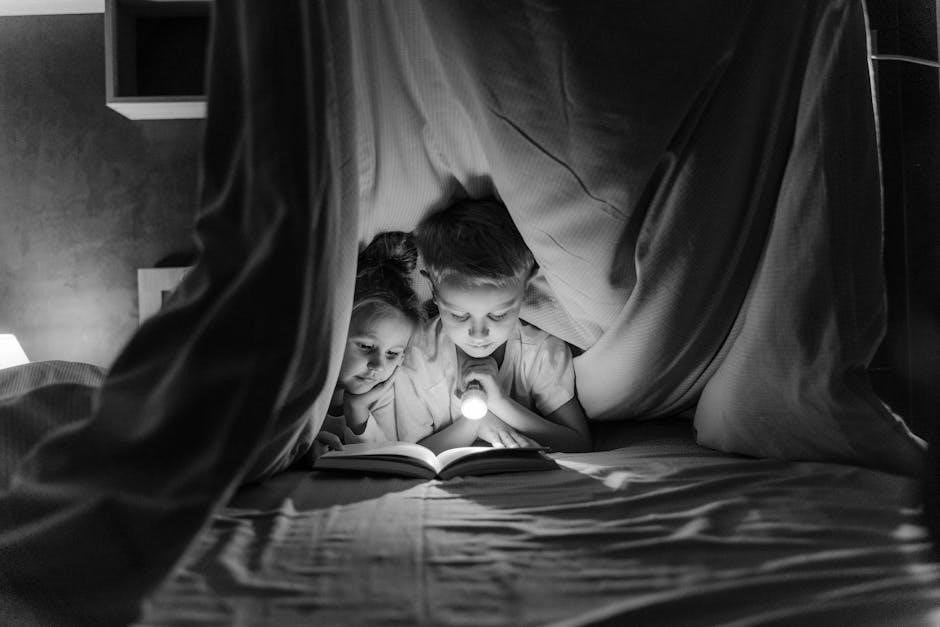night book by elie wiesel pdf

Night is Elie Wiesel’s haunting autobiographical account of his Holocaust experiences․ The book recounts his journey from innocence to the horrors of Auschwitz, exploring faith, humanity, and survival․ Available as a PDF, it remains a vital historical and emotional resource for readers worldwide, offering a profound reflection on one of history’s darkest periods․
Night by Elie Wiesel is a poignant autobiographical account of his Holocaust experiences․ The book details his journey as a young boy from his hometown in Transylvania to the horrors of Auschwitz and Buchenwald․ First published in French in 1958, Night is part of a trilogy, followed by Dawn and Day․ It recounts the emotional and psychological struggles of surviving unimaginable atrocities, exploring themes of faith, hope, and humanity․ Available as a PDF, the book remains a powerful testament to the Holocaust, offering readers a deeply personal and historical perspective on one of the darkest periods in human history․
Background of the Author
Elie Wiesel, a Nobel Peace Prize laureate, was born in 1928 in Sighet, Romania․ He grew up in a devout Jewish family and studied Talmudic law․ Wiesel’s life changed dramatically during the Holocaust when he and his family were deported to Auschwitz․ After the war, he became a prominent writer, advocate for human rights, and Holocaust educator․ His experiences deeply influenced his writing, particularly Night, which he first published in French in 1958․ Wiesel’s work has had a profound impact on Holocaust literature, making him one of the most respected voices on the subject․
Historical Context of the Book
Night is set against the backdrop of the Holocaust, a period of unimaginable horror during World War II․ The book vividly portrays the systematic persecution and extermination of Jews, highlighting the atrocities committed in concentration camps like Auschwitz․ Wiesel’s personal experiences during this dark era form the core of the narrative, making it a powerful historical document of one of humanity’s darkest chapters․
The Holocaust and Its Impact
The Holocaust, a genocide during WWII, resulted in the systematic murder of six million Jews․ Night captures the unimaginable atrocities, including mass executions and brutal labor camps․ Elie Wiesel’s account vividly portrays the psychological and emotional toll, leaving deep scars on survivors and the world․ The Holocaust’s impact extends beyond the war, shaping global awareness of human rights and serving as a reminder of the dangers of hatred and indifference․ The Night PDF highlights these themes, ensuring the Holocaust’s lessons are never forgotten․
Elie Wiesel’s Personal Experiences
Elie Wiesel’s personal experiences during the Holocaust form the core of Night․ At 14, he was deported to Auschwitz with his family, enduring unimaginable suffering․ The book chronicles his loss of faith, separation from his mother and sister, and the bond with his father, which ultimately ended in tragedy․ Wiesel’s memoir, available as a PDF, offers a deeply personal and emotional account of survival, resilience, and the struggle to maintain humanity in the face of unimaginable horror․ His story has become a powerful voice for Holocaust survivors worldwide․

Key Themes in “Night”
Night explores themes of faith, humanity, and survival․ Elie Wiesel’s memoir delves into the loss of innocence, the struggle to maintain hope, and the clash between good and evil․
Loss of Faith and Innocence
In Night, Elie Wiesel vividly portrays the destruction of his faith and innocence during the Holocaust․ As a devout teenager, he grappled with the existence of God amidst unimaginable suffering․ The brutality of Auschwitz, including the hanging of a young boy, shattered his belief in a benevolent God․ The atrocities he witnessed led to a profound spiritual crisis, as he questioned how God could allow such evil․ This loss of faith mirrored the stripping of his childhood innocence, leaving him with a deep sense of moral and emotional despair․ The memoir captures this harrowing transformation, making it a powerful exploration of humanity’s darkest hour․
Humanity and Inhumanity
In Night, Elie Wiesel juxtaposes acts of humanity and inhumanity, highlighting the extremes of human behavior during the Holocaust․ While prisoners often displayed compassion and solidarity, the Nazi oppressors embodied cruelty and indifference․ The memoir vividly illustrates how the concentration camps stripped individuals of their dignity, reducing them to a state of primal survival․ Yet, amidst the chaos, moments of kindness and hope flickered, reminding Wiesel of the resilience of the human spirit․ This duality underscores the profound moral questions raised by the Holocaust, challenging readers to reflect on the capacity for both good and evil within humanity․
Hope and Despair
In Night, Elie Wiesel explores the interplay between hope and despair during the Holocaust․ Initially, hope sustains the prisoners, but it gradually fades as they witness unimaginable atrocities․ The death of loved ones, inhumane conditions, and the silence of a seemingly indifferent God erode their faith․ Yet, even in the darkest moments, glimmers of hope persist, such as the solidarity among prisoners and the will to survive․ Wiesel’s memoir poignantly captures the tension between despair and the enduring human spirit, leaving readers with a profound reflection on the resilience of hope in the face of unimaginable suffering․
Symbolism in the Book
The book explores powerful symbols like night, fire, and silence, representing the void of hope, destruction, and the absence of divine response․
The Significance of Night and Darkness
Night and darkness in Elie Wiesel’s memoir symbolize the void of hope and humanity during the Holocaust․ The literal darkness of the concentration camps mirrors the moral and spiritual blackout․ Night represents the dehumanizing shadows where atrocities occurred, stripping individuals of their dignity․ The recurring theme of darkness also reflects the loss of faith and the absence of divine presence․ For Wiesel, night becomes a universal fear, embodying the terror of the unknown and the irreparable loss of innocence․ It serves as a haunting reminder of the darkness that consumed millions of lives;
Fire as a Symbol
Fire in Night symbolizes destruction, death, and the annihilation of innocence․ The crematoria at Auschwitz, where bodies were burned, represent the ultimate horror of the Holocaust․ Fire embodies the relentless destruction of human life and the erasure of identity․ It also reflects the loss of faith, as Eliezer witnesses the atrocities and questions God’s presence․ The flames of the crematoria become a haunting image, symbolizing the irreversible loss of hope and humanity․ Fire serves as a grim reminder of the Holocaust’s brutality and its enduring impact on survivors’ memories․ It underscores the darkness and despair woven into Wiesel’s narrative․
The Role of Silence
Silence plays a profound role in Night, symbolizing the overwhelming horror and the inability to express the unimaginable atrocities of the Holocaust․ The silence of the victims, the perpetrators, and even God is a recurring theme․ Wiesel describes the silence of those who witnessed the brutality, unable to comprehend or act․ The silence of the dead and the survivors serves as a haunting reminder of the Holocaust’s impact․ It also reflects the emotional numbness and the breakdown of language in the face of such evil․ Silence becomes a powerful testament to the enduring trauma and the impossibility of fully articulating the experience․

Major Events in the Book
Key events in Night include Eliezer’s deportation to Auschwitz, the harsh realities of concentration camp life, and the devastating death march․ Wiesel vividly recounts the liberation and his father’s tragic death, illustrating the unimaginable horrors of the Holocaust․
Deportation to Auschwitz
The deportation to Auschwitz marks the beginning of Eliezer’s horrific journey․ Rounded up with his family, they were forced into cattle cars, enduring cramped and inhumane conditions․ Upon arrival, the brutality of the Holocaust became starkly real․ Families were separated, and the smell of burning bodies filled the air․ Eliezer and his father were sent to the work camp, while his mother and younger sister, Tzipora, were taken to their deaths․ This traumatic event sets the tone for the unimaginable suffering and loss documented in Night, highlighting the Nazi regime’s systematic dehumanization of Jewish people․
Life in the Concentration Camps
Life in the concentration camps was a relentless struggle for survival․ Eliezer and his father endured extreme physical labor, starvation, and brutal treatment from the guards․ The absence of basic human dignity and the constant presence of death created an atmosphere of despair․ Eliezer witnessed unimaginable horrors, including the hanging of a young boy and the burning of bodies in crematoria․ The camps eroded his faith and sense of humanity, as he grappled with the moral and emotional toll of such atrocities․ These experiences are vividly portrayed in the PDF version of Night, offering a harrowing glimpse into one of history’s darkest chapters․
The Death March and Liberation
The death march marked the final stages of Eliezer’s ordeal․ As Allied forces approached, prisoners were forced to march in harsh conditions, many perishing from exhaustion or brutality․ Eliezer’s father succumbed to illness and exhaustion, leaving him alone․ Liberation by American soldiers brought an end to the nightmare, but the emotional scars remained․ The PDF version of Night captures the poignant mix of relief and trauma, as Eliezer struggled to reconcile his survival with the immense loss he witnessed, forever shaping his perspective on humanity and hope․

Style and Structure
Night is written as an autobiographical narrative, blending sparse, powerful language with a fragmented structure․ The 2006 translation enhances its emotional clarity, while the book’s brevity intensifies its impact, reflecting the chaos and disbelief of Wiesel’s experiences․
Autobiographical Narrative
Night is a deeply personal memoir, written in a first-person narrative voice․ Elie Wiesel recounts his harrowing Holocaust experiences, blending vivid details with emotional introspection․ The autobiographical structure creates intimacy, drawing readers into his teenage perspective during the atrocities․ Wiesel’s use of sparse yet powerful language underscores the brutality and disbelief he endured․ The 2006 translation enhances the text’s clarity, ensuring the original French version’s emotional depth remains intact․ This narrative approach makes the Holocaust’s horrors relatable, transforming Wiesel’s story into a universal plea for humanity and understanding․ The book’s brevity intensifies its impact, leaving a lasting impression on readers․
Language and Tone
The language in Night is direct and unembellished, reflecting the raw brutality of the Holocaust․ Wiesel’s tone is somber and reflective, conveying the emotional and spiritual struggles he endured․ The narrative voice is personal and introspective, capturing the loss of innocence and faith․ The language is simple yet powerful, making the atrocities described even more haunting․ The 2006 translation preserves the original’s emotional depth, ensuring the book’s tone remains poignant and thought-provoking․ This clarity and simplicity amplify the authenticity of Wiesel’s account, immersing readers in his harrowing journey․
Structure of the Book
Night is structured into concise chapters, each reflecting a pivotal moment in Eliezer’s journey․ The narrative progresses chronologically, from his deportation in Sighet to his liberation from Buchenwald․ The book’s structure mirrors the gradual erosion of Eliezer’s faith and innocence, with each chapter amplifying the emotional and psychological toll of the Holocaust․ Wiesel’s concise prose underscores the brutality and absurdity of the events, while the clear chapter divisions provide a sense of progression through the unimaginable․ This structure enhances the book’s emotional impact, making it a powerful and enduring account of the Holocaust experience․

Reception and Impact
Night has received widespread critical acclaim for its raw, emotional portrayal of the Holocaust․ Translated into multiple languages, the book has become a cornerstone of Holocaust literature, profoundly impacting readers globally and raising awareness of its atrocities․ Its availability as a PDF has further expanded its reach, ensuring its message endures for future generations․ The book’s influence extends beyond literature, shaping cultural and historical discussions about one of humanity’s darkest moments․
Critical Acclaim and Reviews
Night has garnered widespread critical acclaim for its unflinching portrayal of the Holocaust․ Reviewers praise its raw emotional power and literary significance․ A New York Times review described it as a “remarkable close-up of one boy’s tragedy,” highlighting its ability to convey the horrors of the Holocaust through personal narrative․ The book’s availability as a PDF has further amplified its reach, ensuring its poignant message resonates with modern readers․ Critics often note its importance in Holocaust literature, emphasizing its role in preserving history and fostering empathy․ The memoir remains a timeless, haunting reflection of humanity’s darkest moments․
Popular Reception and Readers’ Responses
Readers worldwide have deeply connected with Night, finding it a powerful and emotional journey․ Many describe it as life-changing, praising its ability to convey the Holocaust’s atrocities through personal experience․ The PDF version has made the book easily accessible, allowing readers to engage with its poignant message digitally․ Readers often express a sense of responsibility to remember the victims and reflect on humanity’s capacity for good and evil․ The memoir’s relatability and universal themes have fostered a strong emotional response, making it a significant work in modern literature and Holocaust education․ Its impact continues to resonate across generations․
Cultural and Historical Significance
Night holds profound cultural and historical significance as a firsthand account of the Holocaust, providing an unflinching look at one of humanity’s darkest periods․ Elie Wiesel’s memoir has become a cornerstone of Holocaust literature, educating generations about the atrocities committed during World War II․ Its availability in PDF format ensures accessibility, preserving its message for future readers․ The book bridges personal and collective trauma, serving as a reminder of the importance of tolerance and remembrance․ Its impact extends beyond history, resonating as a universal warning against hatred and oppression, solidifying its place in global cultural consciousness․
PDF Version of “Night”
The PDF version of Night by Elie Wiesel is widely available for download, offering readers a convenient way to access this powerful memoir․ The digital format preserves the original text’s emotional depth and historical significance, ensuring its message remains accessible to new generations․ With a file size of 1616 kb, the PDF is easily downloadable and compatible with various devices, making it a popular choice for both educational and personal reading․
Availability and Downloads
The PDF version of Night by Elie Wiesel is readily available for download from various online sources․ The file, sized at 1616 kb, ensures easy access to the full text of the book․ Platforms like Google Drive, academic databases, and literary websites offer direct links for downloading the PDF․ Additionally, many online archives and libraries provide free access to the digital version, making it convenient for readers worldwide․ The PDF format is compatible with multiple devices, allowing readers to engage with the memoir on smartphones, tablets, or computers․ This accessibility has made the PDF a popular choice for both educational and personal reading purposes․
Full Text and Translation Options
The full text of Night by Elie Wiesel is available in various formats, including PDF, ensuring accessibility for readers worldwide․ The 2006 translation by Marion Wiesel is widely popular, offering a poignant rendition of the original French version, La Nuit․ Additionally, multiple translations exist, catering to diverse linguistic audiences․ The PDF versions include the complete narrative, allowing readers to explore Wiesel’s vivid descriptions and reflections without interruption․ These translations maintain the emotional depth and historical significance of the original work, making the PDF a reliable source for both academic and personal study․
Reading the Book in Digital Format

Study Guides and Resources
Night study guides and resources are essential for deep analysis․ They include notebook checks, discussion questions, and digital viewing options like flipbooks, aiding comprehensive understanding and engagement with Wiesel’s work․
Notebook Checks and Study Materials
Notebook checks for Night ensure students engage deeply with the text․ These resources include summaries, character analyses, and reflection questions, guiding critical thinking․ Study materials like PDF guides offer structured frameworks for understanding key themes, historical context, and literary devices․ They also provide space for personal insights, fostering a connection with Wiesel’s experiences․ Digital formats make these tools accessible, allowing students to organize their thoughts effectively and prepare for discussions or essays․ These materials are invaluable for a comprehensive study of Night, enhancing both individual and classroom learning experiences․
Discussion Questions and Analysis
Discussion questions for Night encourage deeper exploration of its themes and emotional depth․ Questions like “How does Eliezer’s faith evolve?” or “What role does hope play in survival?” prompt critical analysis․ These inquiries also invite personal reflections, such as “How would you respond in similar circumstances?” Analysis focuses on Wiesel’s narrative style, the symbolism of night, and the psychological impact of the Holocaust․ Such discussions enhance understanding of the book’s historical and moral significance, fostering meaningful conversations about humanity and resilience in the face of unimaginable suffering․
Flipbook and Digital Viewing Options

Personal Reflections and Legacy
Night cemented Elie Wiesel’s legacy as a Holocaust survivor and advocate for peace․ His Nobel Peace Prize recognized his efforts to combat indifference and promote human rights, inspiring global reflection on justice and morality․ The book’s enduring impact continues to educate and move readers, ensuring Wiesel’s voice remains a powerful force against hatred and oppression․ His work transcends time, fostering empathy and understanding among generations․ Through Night, Wiesel’s personal reflections have become a universal call for humanity and compassion․
Elie Wiesel’s Nobel Peace Prize
Elie Wiesel was awarded the Nobel Peace Prize in 1986 for his tireless advocacy against racism, discrimination, and oppression․ The Nobel Committee recognized his work as a Holocaust survivor and his dedication to promoting peace and human rights․ Wiesel’s autobiography, Night, played a pivotal role in highlighting the atrocities of the Holocaust, making him a global voice for justice․ The prize underscored his commitment to educating future generations about the horrors of the past․ Wiesel used his platform to establish the Elie Wiesel Foundation for Humanity, furthering his mission of fostering tolerance and understanding worldwide․
The Book’s Place in Holocaust Literature
Night is a cornerstone of Holocaust literature, offering a harrowing first-hand account of the atrocities committed during World War II․ Elie Wiesel’s vivid storytelling and emotional depth have made the book a seminal work in the genre․ Its unflinching portrayal of life in concentration camps provides a poignant reminder of the human cost of genocide․ As a PDF, Night remains accessible to readers globally, ensuring its message of resilience and the importance of remembering history continues to resonate․ Its impact solidifies its place as one of the most important Holocaust memoirs ever written․
Modern Relevance and Continued Importance
Night by Elie Wiesel remains a vital read in modern times, offering timeless lessons on humanity, hope, and resilience․ Its exploration of faith, identity, and survival continues to resonate with readers, making it a cornerstone of Holocaust education․ The book’s themes of injustice and prejudice serve as a warning against hatred and indifference․ As a widely available PDF, Night ensures its message reaches new generations, fostering empathy and understanding․ Its enduring relevance underscores the importance of remembering history to prevent its repetition, solidifying its place as a modern classic of Holocaust literature․
Leave a Reply
You must be logged in to post a comment.